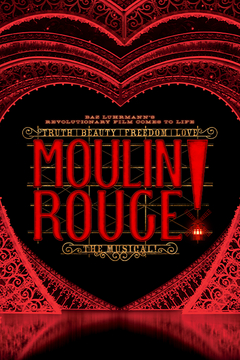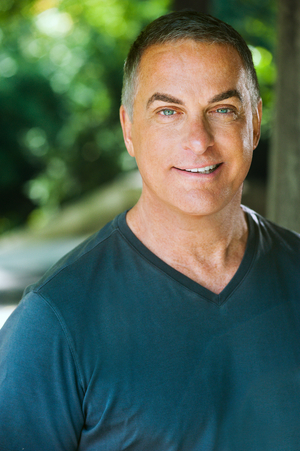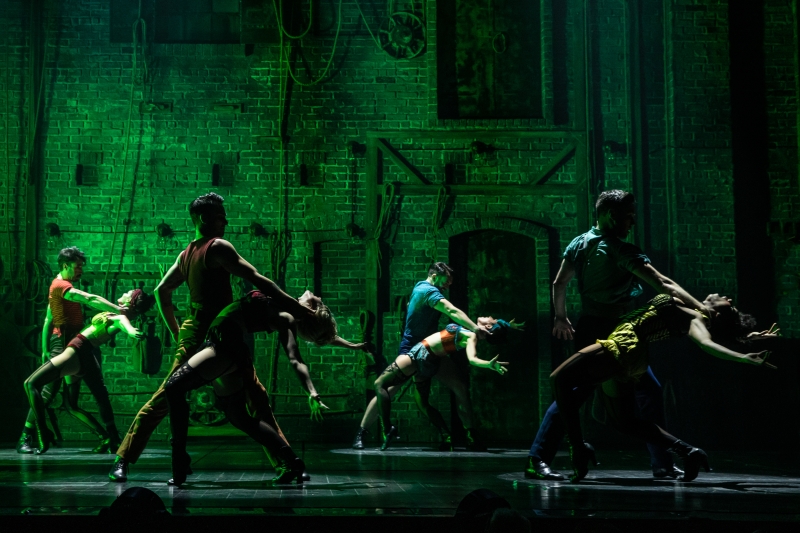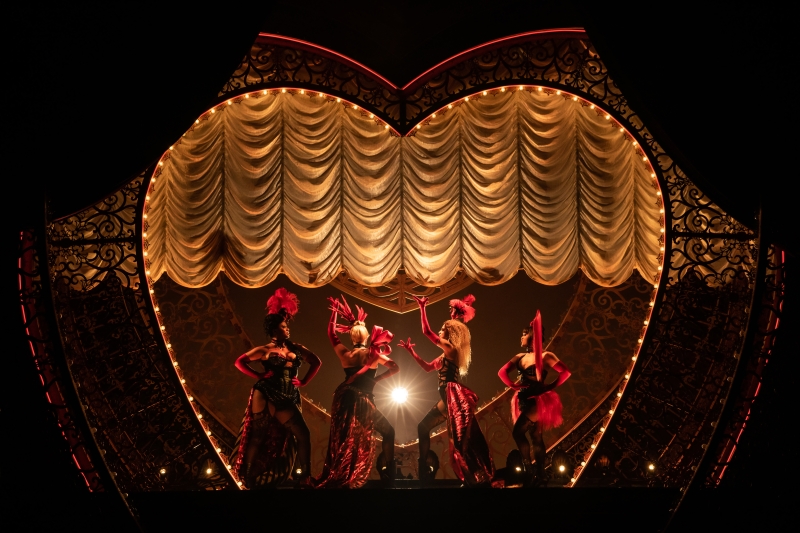Stage Manager Stories: Michael J. Passaro, MOULIN ROUGE! THE MUSICAL
Michael has over thirty years’ experience as a Production Stage Manager for theatrical productions – on Broadway, regionally, and world-wide.

|
|

Need a cue? Call a stage manager. Need a line? Call a stage manager. Need a day off? Call a stage manager. Need a call time, a schedule, an inspection, a to-do list, a floor plan, a script, or just a pep talk? Call a stage manager!
When it comes to the hardworking folks behind the scenes of your favorite shows, perhaps no one works harder than the stage manager. Acting as the liason from the crew to the creatives and from the creatives to the company, the title "stage manager" is an umbrella term for the numerous roles these individuals play that bring order to the chaos of putting up a production.
Each month, BroadwayWorld is spotlighting stage managers from across the theatrical spectrum, shedding a much-deserved light on the breadth of responsibilities these theatrical jacks-of-all-trades take on and the heart, hope, and humor they bring to their work as Broadway returns from its lengthy shutdown.
This month, we're chatting with Michael J. Passaro, Production Stage Manager for the Tony Award-winning Best Musical, Moulin Rouge the Musical!
Michael has over thirty years' experience as a Production Stage Manager for theatrical productions - on Broadway, regionally, and world-wide. His numerous Broadway credits include the original productions of Starlight Express, The Will Rogers Follies, Angels in America, The History Boys, A Steady Rain, (starring Hugh Jackman and Daniel Craig), The Cher Show, and How To Succeed in Business Without Really Trying starring Daniel Radcliffe.
In addition to his professional practice, Michael is an Associate Professor and Advisor for the MFA Program in Stage Management at Columbia University. He holds an MA in Arts Management from NYU.
We caught up with Michael as he was in the midst of tech rehearsals for the upcoming Moulin Rouge! national tour to chat about the show, his incredible career, and the many facets of the role of the Stage Manager.
You're out of town putting up the Moulin Rouge! national tour, how is that going?
It's going great, and the reason that it's going great, I think, is because of the incredible synergy that we have between our fantastic, multi talented, unbelievable creative team and the kind of institutional knowledge that they have about Moulin Rouge!, on a macro level and at a very micro level as well. This is now the fourth production that I've had the privilege of being involved with, so the synergy between what I bring to the table, in terms of my own skill set and knowledge about the granularity of the show combined with their overall artistic integrity makes for a very easy and pleasurable process.
Where are you currently in terms of getting the show up?
We're on our third full day of tech and we are right where we should be in terms of meeting our daily goals that we've set for ourselves. We've honed the daily process of the tech period. So specifically based on all of the knowledge that we've gained from the Broadway production and the other international productions, we can easily pivot if we need to for whatever reason, but we can also hit goals that are attainable and allow the show to breathe in a new space and with an entirely new group of human beings who are creating it. There's a template to it, but it's a template that is very holistic in nature and allows the human element to really thrive in it as well.

What, in your opinion, are the most exciting and challenging aspects of managing such an enormous production?
Well, the technical splendor of Moulin Rouge! is so connected to the structure and the dramaturgy of the show, the design of it and the technicality of it is very easy to replicate on a nightly basis, but the most challenging and exciting thing about that space and that landscape, are the humans who play in it every night. My job is mostly exciting because of all of the folks who work there. The thing that's also super thrilling about Moulin Rouge! is that Alex [Timbers] and the team have specifically designed it so that there really is no separation between front of house and the show onstage. The moment the audience walks into the Hirschfeld Theater, or any of the theaters where it's playing, they are immediately enveloped in an experience and an experiential environment. My job is not just about what happens, you know, upstage of the proscenium, it's about what happens in the entire building. And when I say "my job," I want give an enormously huge note of deep gratitude to the stage management team that supports not only me personally, but supports the entire building. The job is all day long, by the time we do rehearsals and set up the show and do the show at night, we spend more time with each other than we do with our own families. And they approach that job with excitement and with energy and with compassion and care, every minute, every day.

After all this time and all these productions, are there still aspects of the work that intimidate you? Do you still get nerves or butterflies before a show?
Yes. Absolutely, one hundred percent, and I would be nervous if I didn't. The physical act of calling Moulin Rouge! employs all of the senses, because you have to be totally connected, with your eyes, your ears, and your voice, you know? I don't actually call the show very much anymore, maybe once or twice a week at the most, but when I stand at that stage manager desk and get started, I feel my heart racing. There's an incredible nervous energy to it.
With such an incredible amount of experience under your belt, what would you consider your most challenging production so far, and what lessons did you take out of it?
I was working on a play called The Testament of Mary, it was a one person show starring the wonderful, incredible actress, Fiona Shaw. There were like 300 sound cues and as many light cues and the play was an hour and a half, so there was a lot just to call, but very early on in the dress rehearsal process, she'd come to me and we would spend like hour and a half after every dress rehearsal performance going through all these things. And early on, she said to me, "You have to understand, Michael, that I'm acting with you. You're acting with me. I'm the only person out there when these cues happen, so you're my acting partner." And this idea that we're connected to the energy on stage in terms of the performance is something that I always sort of knew, but Fiona really made me understand this in a whole new way, it made the work that much more challenging, but also that much more exciting.
After so many years of working steadily, how did you weather the shutdown? What was it like to return to the theatre after such a long time?
Very early on in my career, a wonderful, experienced general manager by the name of Peter Neufeld told me if you were to work on Broadway, you must understand that you have to, of course, as a stage manager have a mind that has a great attention to detail, but you also have to have a heart that understands that working in this business, especially on Broadway, makes great demands on the soul. It's such a profound statement to me, and it was given to me as a gift, as a very young theater practitioner, and I've carried that with me every single day.
When the shutdown happened, I had been very much feeling like I've been lucky enough to be working steadily for, you know, 5, 6, 7 years really without a break. So the shutdown happened, I thought, "Oh, okay, let me just take this moment for myself." It was supposed to be three weeks to restart. Then it was three months and it was six months and it was a year, and then it was close to 18 months. During that time, I really came to understand that on a very deep level that this work makes great demands on the soul, but it's also a great balm for the soul. I came to miss it very, very, very much, and the time commitment of eight shows a week and all that goes along with it. I came to understand that my being is wired to be in that environment, perhaps because I've been in that environment for so long. Coming back to it was an incredible celebration of all the things that I have been lucky enough to participate in and really make part of my own being. It was quite a journey.
What sort of advice would you have for a young person hoping to make a career as a stage manager?
That this job is much, much, much more than cue calling, it's much more than setting up paperwork, it's much more than any of those administrative tasks, which are incredibly important, but the more important thing than in my mind is that you are able to really relate to the people you are working with in the room on the most human level possible. Other advice would be to say no to nothing. If you are offered an experience as an early career stage manager, you never know that that's going to lead to. Go on tour if you have the opportunity to do so. It's an incredible way to quickly understand what you need to do in terms of stage management, not only in terms of the technical skill set, but also in terms of the human skill set as well.
Videos


